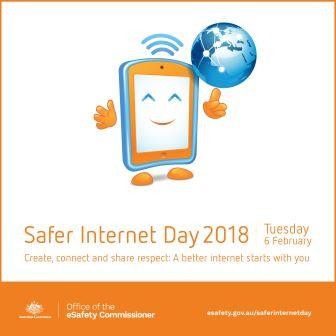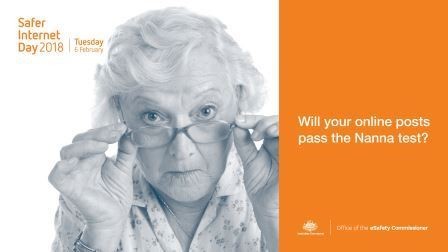6 February 2018 is Safer Internet Day

With around 14 million Internet subscribers in Australia (ABS, 2017), most of us rely on the Internet for work, study, performing daily tasks such as shopping and banking, keeping up with the news, and for socialising.
As we often use the Internet at work and in our homes, we feel safe in our own spaces and are not always aware of risks or threats to our safety. But Internet use involves sharing our data - we give people access to very personal information about our lives, finances, activities, what we look like and where we are. The Internet is a fabulous tool that can make our lives easier and give us access to services, information and social opportunities, but we need to protect ourselves and those we love by learning how to stay safe.
Safer Internet Day encourages a better Internet, with the message “Create, connect and share respect: A better Internet starts with you”. It also aims to give advice and information to all Australians, young or old, about Internet safety.
At State Library of Queensland we’re passionate about helping people to connect with information and make the most of online opportunities in a safe physical and digital environment. Libraries offer safe comfortable spaces for families and people of all ages, with friendly professionals you can talk to about staying safe online. These are just some of the great resources available to help you stay safe online:
Tech Savvy Seniors
Telstra Tech Savvy Seniors Page
- Can I trust the Internet?
- How to protect your computer
- Safe Internet browsing
- Keeping your home network secure
- How to backup your computer
Learn about cybersecurity with lynda.com
- Cybersecurity while travelling
- Mobile device security
- Electronic commerce security
- Security for cloud services
For more information about lynda.com, visit /search/eresources/lynda.com
Tackling cyberbullying – www.esafety.gov.au
The eSafety Commissioner’s website at www.esafety.gov.au has a range of practical resources for schools, teachers, parents and teens, to help prevent and deal with cyberbullying, and to report illegal content or image-based abuse. While there is a lot to discover on the site, a couple of great features are the free virtual classroom program for schools, and the eSafety information under the heading “Games, apps and social networking”. This area gives up-to-date information on all the latest social networking apps and games, giving clear guidelines for use, and explanations about possible dangers on the app, protecting yourself, updating privacy settings, how to not share your location, whether or not money can spent within the app, tips for parents, blocking people and how to report issues. This valuable tool helps parents and carers understand their kids’ apps and how to stay safe.
QUT’s online modules “Create a better online you” at https://www.library.qut.edu.au/a-better-online-you/#/ compares your social media attitudes and knowledge with others, and provides tips to help you control your online presence. This is a really effective reminder for teens and young adults about the dangers of oversharing information and the importance of mindful social media use.

Safer Internet Day, 6 February 2018
And on Safer Internet Day, the question “Will your online posts pass the Nanna test?” reminds Internet users of all ages to think about our online actions as carefully as our face-to-face interactions, and to share respect.
Fiona Dixon
Librarian
Visitor and Information Services
More information:
https://www.telstra.com.au/tech-savvy-seniors
Lynda.com: /search/eresources/lynda.com
Office of the eSafety Commissioner: https://www.esafety.gov.au/
QUT’s “Create a better online you”: https://www.library.qut.edu.au/a-better-online-you/#/
Visit us: /visit-us
Ask us: /services/ask-us
Young people needing support can contact the Kids Helpline on 1800 55 1800.
Parents and carers can call Parentline on 1300 30 1300.
Comments
Your email address will not be published.
We welcome relevant, respectful comments.